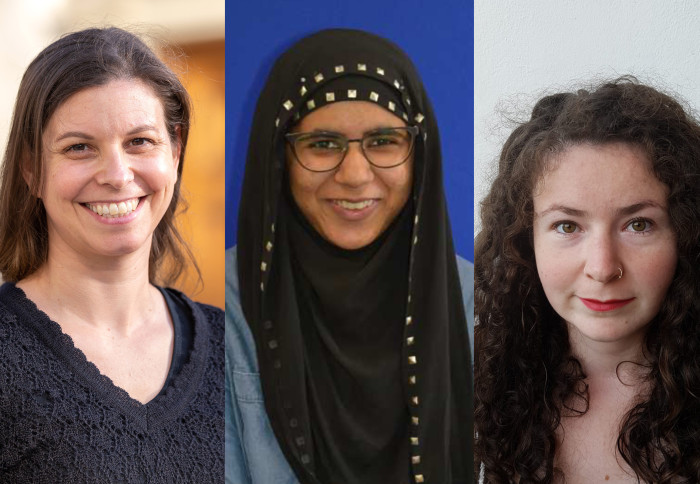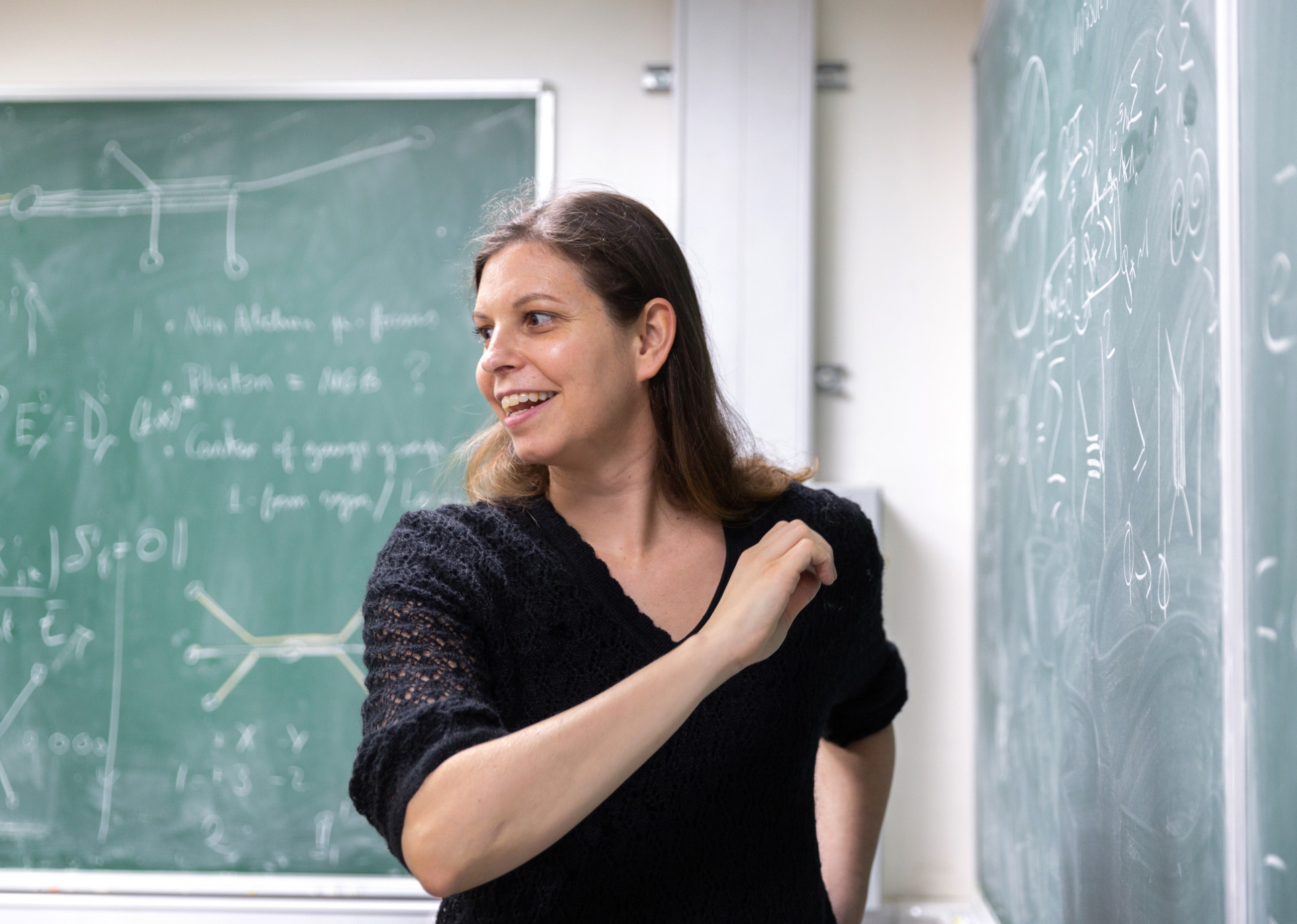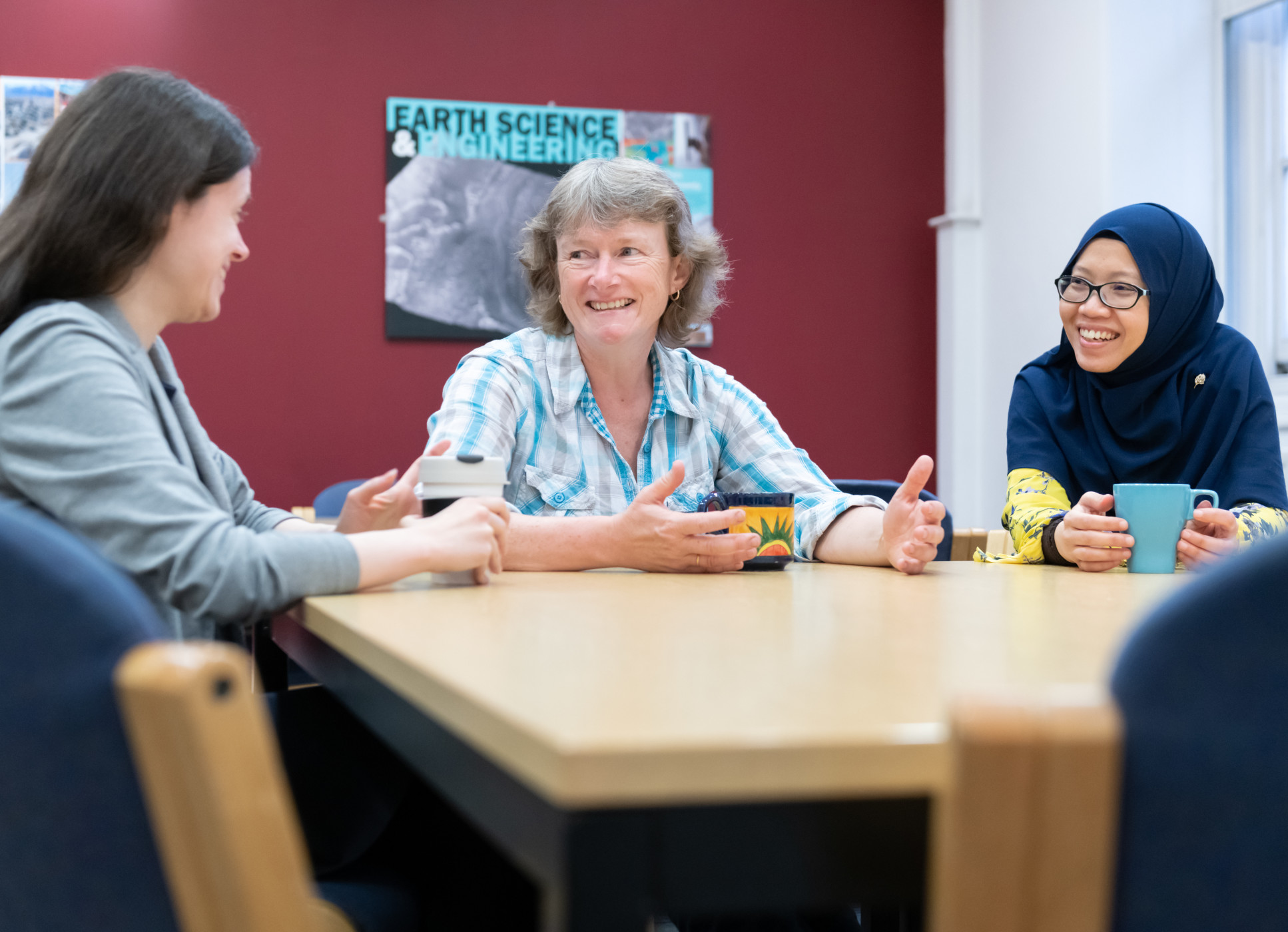Women in science: Professor Claudia de Rham, Helena Dodd, Aatikah Majid
by Jacklin Kwan

Professor Claudia De Rham (left), Aatikah Majid (middle), Helena Dodd (right)
For International Day of Women and Girls in Science, we spoke to three women at different stages of their science journeys from FoNS.
Professor Claudia de Rham who is a cosmologist from the Department of Physics, who develops and tests new models for the evolution of the universe. Her work touches on fundamental challenges like understanding the nature of gravity, uncovering the mystery of dark energy and probing signatures from the Early Universe.
Aatikah Majid is a PhD student in the Department of Chemistry whose project is based on the synthesis and selection of DNA structures as sensing probes. She is currently doing a three-month placement at Charles River Laboratories where she works in drug development research. She is part of the first cohort for the EPSRC Centre for Doctoral Training (CDT) in Next Generation Synthesis & Reaction Technology at Imperial.
Helena Dodd is the President of the WOMENinSTEM@IC Network, which is a network run by postgraduate students and staff with the goals of promoting women in science-related fields. She has recently finished her PhD in chemical biology. She also does a variety of outreach work such as volunteering with the National Women’s Engineering Society and judging at the national Big Bang Fair, the UK’s National Science competition for young people aged 13 to 19.
What motivated you to pursue science as an academic or professional path?
Claudia: I think it's hard for me to say because I never thought of anything else. I was always very curious, so that's really where the passion comes from. I realised that I was more interested in modelling later on, understanding the behaviour of things rather than analysing it. So, for instance, I did an internship at the Jet Propulsion Laboratory at NASA, which was fascinating. I was exploring the magnetic field and the gravitational field of Mars, but then I realised it's a lot of data analysis, and what I like more is trying to uncover the laws of nature. So that’s why I do the type of physics that I do. It’s where we need to think hard about what, for example, gravity fundamentally is.
Aatikah: It’s very, very traditional answer but when I was quite young, I really wanted to be a doctor in medicine, and I actually applied for medicine as an undergraduate degree. Unfortunately, I didn’t get a place but one of the universities I applied to asked me if I wanted to come over and do medicinal chemistry and biology. In my mind, I was like, “I’ll do it for one year and then I’ll just transfer across to medicine,” but by the end of that year, I realised I actually really enjoy chemistry! It’s really opened my eyes. I think one of the things I always loved when I was a kid was trying to understand how the world works, so I always find it really interesting how we can get a better understanding of biology from chemistry.
Helena: I always liked science at school, but my teachers would always tell me that if I liked science, I should become a medical doctor, so I kind of thought that was the only option. I didn't know that you could do science as research and specialise in a subject. So, I started down the medicine path and I did some work experience but when it came to applying to universities, I realised it wasn't for me. I realised that I wanted something where I could be in a lab and do the research component. I decided to pursue chemistry where I could help cure people in a different way from being a medical doctor.

Did you have any role models or people who supported you in your journey?
Claudia: I can't really pin down any role models in particular. When I did my undergrad in Switzerland, there were actually no female lecturers at all. In my whole degree, there wasn't a single woman lecturing and the number of women on my physics course kept declining during each year. So, I didn't really attach myself to any figure as I was doing undergrad. But it's true that when I started doing my PhD in Cambridge, I was always fascinated by Stephen Hawking, and my supervisor Anne-Christine Davis, was the first woman professor of mathematics in Cambridge. It’s very inspiring to see that there are people that are pushing the norms of what is possible within our field.
Aatikah: My parents. Obviously they want their kids to be doctors but they tried very hard: they got me all the courses, all the textbooks, all the practice. When I said I was going to swap to chemistry and I wasn't going to pursue medicine at all, they were still very supportive. I think they're quite thankful that I am doing a PhD now, so I get still get to have ‘Dr’ in front of my name. I'll be the first person in my family and my extended family who holds a PhD! Apart from my family, I'm quite lucky to work with so many great female scientists who inspire me both inside and outside of the lab.
Meeting professional scientists was really life-changing because it finally felt like I had met my people. Helena Dodd Department of Chemistry
Helena: So I didn’t have many scientific role models until I made it to university because I come from a low-income background. I went to a school where the teachers hadn’t necessarily done science degrees, so I hadn’t really met anyone who was a scientist until I participated in the Big Bang Fair. Meeting professional scientists was really life-changing because it finally felt like I had met my people. And at university, I was really lucky to be assigned an amazing personal mentor who was the first woman in science I had seen to make it to a senior position. She supported me all throughout my undergraduate degree.
Do you think you have faced any personal challenges on your way here?
Claudia: I could give you concrete examples, but the reality is that, by themselves, the small incidents don’t matter that much. People may comment about women not being able to achieve as much or may assume you need more help… You can go to a conference and some people assume that you’re part of the catering staff by default. Individually none of these incident matter that much. The real challenge is when you put them all together. Before, starting studying physics I never really questioned myself but slowly I was faced with constant pressure that made me re-evaluate who I was and whether or not I should be here. What’s really important is to realise that everyone faces those questions. But there is always a unique way of being a scientist – you can create your scientist identity.
Aatikah: I think mine has been coming to terms with the idea that this isn't how I envisaged my life and that's okay. It’s okay to have a dream when you were a child and have it not be the dream you have when you’re 27. That doesn't mean that you've let your young self down, it just means that you've grown as a person. I think I’ve also struggled trying not to talk myself out of the rooms that I’ve earned for place to be in. Even when I was applying for this PhD, my friend had to keep reminding me not to do that when I kept saying, “I don't know if I'll get in.” It doesn’t matter if you're a woman or a person of colour, you have worked just as hard as anyone else.
Helena: I do think the impact of not knowing any scientists or anyone with a career in science is really underestimated. When I entered university, I was really surprised to see that so many people had already done internships and placements before university at companies where their parents work. Lots of people have parents who were scientists and engineers, and could help them write cover letters and CVs. I'm still aware that I've had lots of privileges and I've been very lucky in many ways. There's a lot of people, especially in minority groups, that face much bigger barriers.

How do you recover from bad days that shake your confidence – an experiment fails or you do badly on a test…
Claudia: There's definitely bad days, even nowadays, where I think I should just quit. But I think it's the little discoveries I make that just make me happy – nothing groundbreaking, nothing that's going to be the cover of Nature, but something just for you. You just get to understand something new for yourself and I realised, okay, that's all I need. Also, sometimes you talk to someone on the street, or you go into the shop and people ask you what you do, and get to share a bit of your passion. Every so often, you hear someone saying, “Oh, wow, that's fascinating.” Some people pretend they “hate physics” that “it was their worst subject at school” but I think everyone deep down finds it fascinating. You just need to hold on to these very precious moments where you think you're learning a little bit more for yourself and for society.
[E]verything will go wrong for 29 days, and then the last day of the month, everything will work. And it's that feeling of when things work that makes it all worth it. Aatikah Masjid Department of Chemistry
Aatikah: I've had many, many days where experiments don’t work – you go into the lab and just everything has gone wrong and it's one thing after the other, and I'll go home and tell my family, “You know, I'm just a bit depressed today.” But you have to shake it off and get yourself a little treat because the whole point about research is everything will go wrong for 29 days, and then the last day of the month, everything will work. And it's that feeling of when things work that makes it all worth it.
Helena: It's hard. It's taken me quite a few years to sort of learn how to do that, but I think for me it's thinking of the bigger picture and reminding myself of why I'm here. Especially during my PhD, I felt a huge sense of responsibility because I was funded by taxpayer money and I was doing medical research where I was trying to make and test new drugs for potential cancer immunotherapy applications. So whenever I did something that didn't work, I thought, “Oh no, I'm letting everyone down.” But I’ve learned to say to myself: it doesn't matter if I’m not the absolutely best person in the world to do this. I am doing it, and I owe it to myself and everyone who's supporting me to give it the best shot that I can.
What do you think needs to happen to increase diversity in science?
You can really apply physics to everything, and because of that, everybody's welcome in science and physics. Professor Claudia De Rham Department of Physics
Claudia: When I talk to young physicists, they find it very unclear what it means to be a physicist. We have a picture of a physicist as someone working alone, someone typically a bit older and that has a miserable life. Actually, being a physicist is something very exciting. So, just being able to share that vision with younger women and underrepresented people is important. Just because you do physics doesn’t necessarily mean doing research in a very specific area. Physics opens all sorts of doors: there are people doing climate change research after being a physicist; there are people doing biophysics; there are people doing politics; there are people going in all sorts of directions. You can really apply physics to everything, and because of that, everybody's welcome in science and physics.
Aatikah: I think one thing is that it definitely helps seeing other people like you in science positions: female academics and female professors. It opens the door for you to know that you could do that if someone else has done it. But then I think you also need a bit of courage. If you don't see someone like that, you need to feel like you can be the first one and open the door for others to follow. I was the first person of colour on my CDT, and everyone's been so welcoming. It's really nice when you can see down the line: how many more women and how many more people of colour have joined.
I think people who aren’t from underrepresented backgrounds are sometimes the loudest in the room. There are people on my course who have been very helpful when I am trying to get a point across in opening the conversation up to me. If you can see that someone isn't partaking, if you'd directly ask, “What do you think about this?”, you give them that chance to speak with their own voice.

Helena: I think this question gets very complicated because being women and girls have lots of different intersectional identities. For example, girls that go to a private school and have financially privileged upbringings are in a very different situation to girls who haven't had that. But, in general, having role models is key. I was lucky that I got involved with extra-curricular things and that my parents supported that. I did the Big Bang Fair and got to see women in STEM through that. So, I think a good way to encourage future generations to pursue STEM is to show them the options – showcasing people who have made those decisions and done those things. I particularly love doing workshops in schools because I think then it's a good way of demonstrating that STEM can be fun.
What’s something that excites you about science in the next 10 years?
Claudia: We’re now at a stage where gravitational waves have been discovered, the Higgs has been discovered, most of our observations seem to converge and we may wonder what’s at the next frontier. But then every so often you hear of small discrepancies. It may be nothing, or it may mean we are on the edge of a new discovery. We don’t know and that’s very exciting! To me, something that has really changed things dramatically is the direct detection of gravitational waves. Until then, everything we had learned about our surroundings was through light: we see things with instruments and telescopes but, just a few years ago, we detected first gravitational waves. That's a completely new way to communicate with the universe. It's like, all of a sudden, we can see things in color; we can hear the universe. So, it really creates an entirely new perspective and in how we can learn further.
Aatikah: Science is so open-ended. Every time we think we know what's exactly going on, it turns out we actually don't know anything. Every single day there is a big discovery. Just look at what the photos we took of planets 20 to 30 years versus new photos you get from the James Webb Telescope every day. In the lab doing experiments, it’s like puzzle pieces click together and you get to see the wider picture of the universe, but it’s just for a second. I love learning things and so I think this is like just the perfect career because you're learning every single day.
Helena: I think there's been a real positive trend towards accessibility of science. I think things are moving in a positive direction for disabled researchers and minorities because we’ve been able to have more accommodations and more flexible ways of working. I think diversity is always a good thing because you can solve problems a lot better if you have people from different perspectives and different experiences sharing their knowledge as opposed to just one type of person that all might have a similar opinion.
Article text (excluding photos or graphics) © Imperial College London.
Photos and graphics subject to third party copyright used with permission or © Imperial College London.
Reporter
Jacklin Kwan
Faculty of Natural Sciences